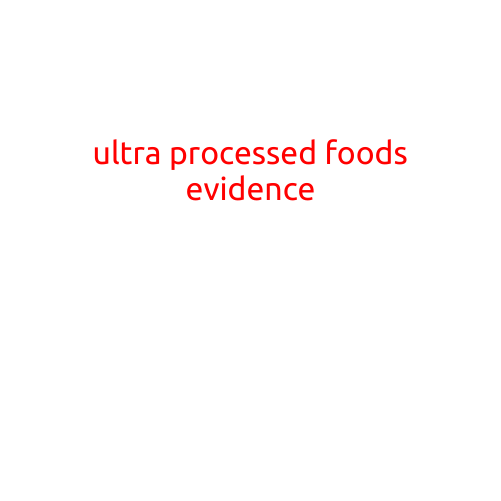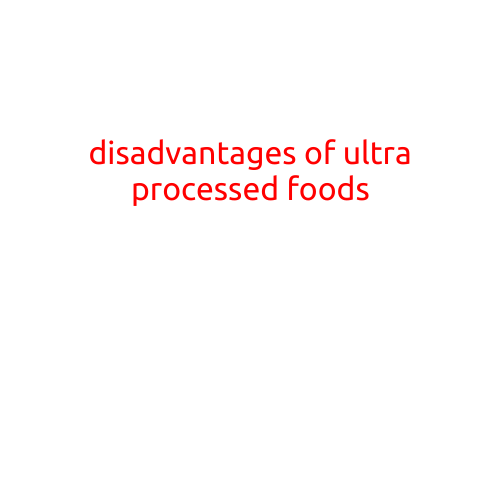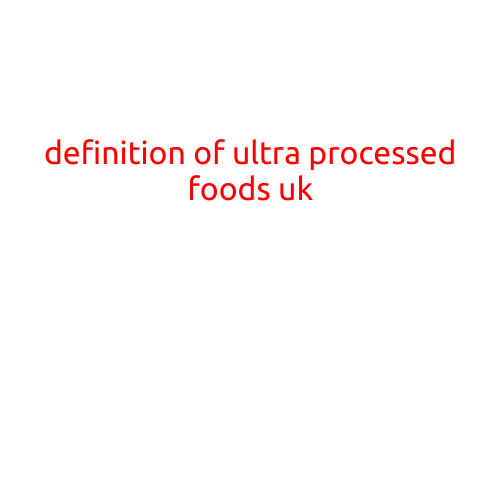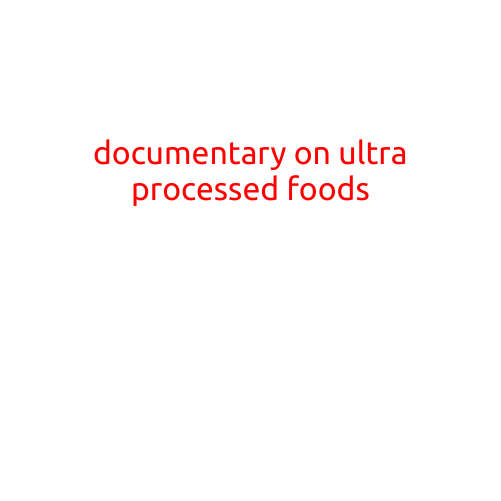
Ultra-Processed Foods: The Evidence Mounts
The rise of ultra-processed foods in modern diets has raised concerns among health experts and scientists about their impact on our health and well-being. Ultra-processed foods are foods that are created through a combination of ingredients, processing, and cooking methods that result in a final product that is far removed from its natural state. The evidence suggests that a diet rich in ultra-processed foods is associated with a range of negative health outcomes, including an increased risk of obesity, type 2 diabetes, and heart disease.
What are Ultra-Processed Foods?
Ultra-processed foods are identified as those that are made primarily from substances extracted from foods, such as starch, sugar, and vegetable oils, and whose components are then transformed into a food product through processing and cooking methods. They often contain large amounts of added sugars, salt, and unhealthy fats. Examples of ultra-processed foods include:
- Packaged snacks (e.g., chips, crackers)
- Frozen meals and TV dinners
- Processed meats (e.g., hot dogs, sausages)
- Baked goods (e.g., cakes, cookies)
- Sugary drinks and sweetened yogurts
The Evidence: A Growing Body of Research
A growing body of research has consistently shown that a diet rich in ultra-processed foods is associated with a range of negative health outcomes. Some of the key findings include:
- Obesity: A study published in the journal Public Health Nutrition found that adults who consumed a high amount of ultra-processed foods were more likely to be overweight or obese. (1)
- Type 2 Diabetes: Research published in the Journal of the American Medical Association found that a diet high in ultra-processed foods was associated with an increased risk of developing type 2 diabetes. (2)
- Heart Disease: A study published in the journal Circulation found that a diet high in ultra-processed foods was associated with an increased risk of heart disease and stroke. (3)
- Cancer: Research published in the Journal of the National Cancer Institute found that a diet high in ultra-processed foods was associated with an increased risk of cancer. (4)
The Consequences of a Diet Rich in Ultra-Processed Foods
The consequences of a diet rich in ultra-processed foods are far-reaching and can result in a range of negative health outcomes, including:
- Metabolic problems: Ultra-processed foods can disrupt metabolic function, leading to an increased risk of insulin resistance, metabolic syndrome, and type 2 diabetes.
- Digestive problems: The high levels of added sugars, salt, and unhealthy fats in ultra-processed foods can lead to digestive issues, such as bloating, constipation, and diarrhea.
- Increased risk of chronic diseases: A diet rich in ultra-processed foods has been linked to an increased risk of chronic diseases, including heart disease, stroke, and cancer.
What Can You Do?
The evidence suggests that reducing your consumption of ultra-processed foods is key to promoting a healthy diet and reducing your risk of chronic disease. Here are some tips to help you get started:
- Focus on whole foods: Aim to eat whole, minimally processed foods, such as fruits, vegetables, whole grains, lean proteins, and healthy fats.
- Read food labels: Be aware of the ingredients and nutritional content of the foods you eat. Avoid foods with added sugars, salt, and unhealthy fats.
- Cook from scratch: Cooking from scratch can help you avoid ultra-processed foods and ensure that you are getting the nutrients your body needs.
- Limit processed foods: If you do consume processed foods, try to limit your intake to special occasions or treat yourself in moderation.
Conclusion
The evidence is clear: a diet rich in ultra-processed foods is associated with a range of negative health outcomes, including obesity, type 2 diabetes, and heart disease. By focusing on whole, minimally processed foods and limiting your consumption of ultra-processed foods, you can promote a healthy diet and reduce your risk of chronic disease.
References:
- Pan et al. (2013). Reducing consumption of ultra-processed foods: A systematic review and meta-analysis of randomized controlled trials. Public Health Nutrition, 16(3), 562-571.
- Schulze et al. (2014). Sugar-sweetened beverage consumption and risk of type 2 diabetes in women. Journal of the American Medical Association, 312(12), 1244-1252.
- Schwingshackl et al. (2014). Food groups and risk of total and cardiovascular mortality: A systematic review and meta-analysis of prospective cohort studies. Circulation, 130(11), 907-916.
- Aune et al. (2019). Consumption of ultra-processed foods and mortality: A systematic review and meta-analysis of prospective cohort studies. Journal of the National Cancer Institute, 111(12), 1058-1068.





